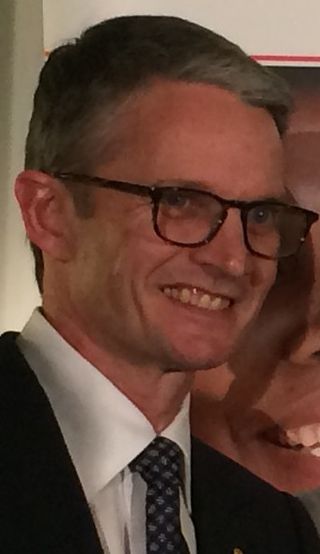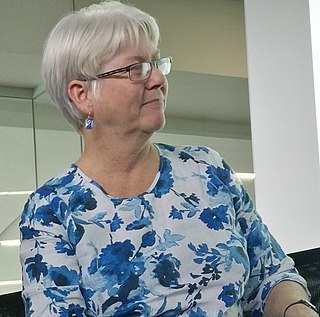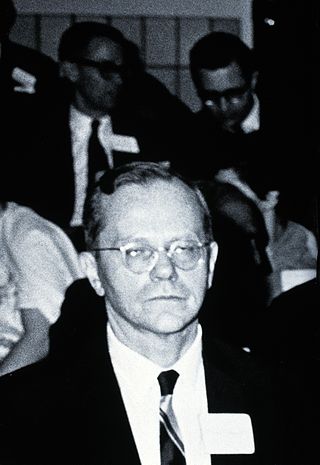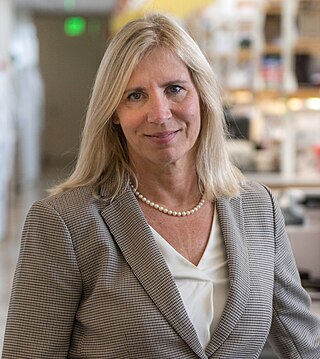
Plasmodium is a genus of unicellular eukaryotes that are obligate parasites of vertebrates and insects. The life cycles of Plasmodium species involve development in a blood-feeding insect host which then injects parasites into a vertebrate host during a blood meal. Parasites grow within a vertebrate body tissue before entering the bloodstream to infect red blood cells. The ensuing destruction of host red blood cells can result in malaria. During this infection, some parasites are picked up by a blood-feeding insect, continuing the life cycle.

Artemisinin and its semisynthetic derivatives are a group of drugs used in the treatment of malaria due to Plasmodium falciparum. It was discovered in 1972 by Tu Youyou, who shared the 2015 Nobel Prize in Physiology or Medicine for her discovery. Artemisinin-based combination therapies (ACTs) are now standard treatment worldwide for P. falciparum malaria as well as malaria due to other species of Plasmodium. Artemisinin is extracted from the plant Artemisia annua a herb employed in Chinese traditional medicine. A precursor compound can be produced using a genetically engineered yeast, which is much more efficient than using the plant.

WEHI, previously known as the Walter and Eliza Hall Institute of Medical Research, and as the Walter and Eliza Hall Institute, is Australia's oldest medical research institute. Sir Frank Macfarlane Burnet, who won the Nobel Prize in 1960 for his work in immunology, was director from 1944 to 1965. Burnet developed the ideas of clonal selection and acquired immune tolerance. Later, Professor Donald Metcalf discovered and characterised colony-stimulating factors. As of 2015, the institute hosted more than 750 researchers who work to understand, prevent and treat diseases including blood, breast and ovarian cancers; inflammatory diseases (autoimmunity) such as rheumatoid arthritis, type 1 diabetes and coeliac disease; and infectious diseases such as malaria, HIV and hepatitis B and C.

Proguanil, also known as chlorguanide and chloroguanide, is a medication used to treat and prevent malaria. It is often used together with chloroquine or atovaquone. When used with chloroquine the combination will treat mild chloroquine resistant malaria. It is taken by mouth.

Douglas James Hilton is an Australian molecular biologist. He is the CEO of CSIRO and immediate past Director of the Walter and Eliza Hall Institute of Medical Research in Melbourne, Australia. His research has focused on cytokines, signal transduction pathways and the regulation of blood cell formation (hematopoiesis). Hilton was the President of the Association of the Australian Medical Research Institutes (AAMRI) from 2014-16.
Chetan Eknath Chitnis is an Indian scientist in the field of malaria research. He is the head of the Malaria Parasite Biology and Vaccines Unit at the Institut Pasteur in Paris and an elected fellow of the Indian Academy of Sciences (2009) as well as Indian National Science Academy (2014). He received the Shanti Swaroop Bhatnagar Award in 2004 and the Infosys Prize in Life Sciences 2010. Chitnis is the former principal investigator of the malaria research group at the International Centre for Genetic Engineering and Biotechnology (ICGEB) in New Delhi.
Russell J. Howard is an Australian-born executive, entrepreneur and scientist. He was a pioneer in the fields of molecular parasitology, especially malaria, and in leading the commercialisation of one of the most important methods used widely today in molecular biology today called “DNA shuffling" or "Molecular breeding", a form of "Directed evolution".

Brendan Scott CrabbFASM is an Australian microbiologist, research scientist and director and chief executive officer of the Burnet Institute, based in Melbourne, Victoria, Australia.

Jane Visvader is a scientist specialising in breast cancer research who works for the Walter and Eliza Hall Institute in Melbourne, Australia. She is the joint head of the Breast Cancer Laboratory with Geoff Lindeman.

Leann Tilley is Professor of Biochemistry and Molecular Biology in the Bio21 Molecular Science and Biotechnology Institute, The University of Melbourne.

William Trager was an American parasitologist, professor at Rockefeller University, and member of the National Academy of Sciences of the United States. Trager's research focused on developing microbiological culture systems for a variety of eukaryotic pathogens. He is best known for developing a culture system for the malaria parasite Plasmodium falciparum with James Jensen in the 1970s.
David James Kemp OAM FAA was an Australian plant geneticist and parasitologist.
Yagya Dutta Sharma is an Indian molecular biologist, professor and head of the department of biotechnology at the All India Institute of Medical Sciences, Delhi. An elected fellow of all three major Indian science academies — Indian National Science Academy, Indian Academy of Sciences, and National Academy of Sciences, India — Sharma is known for his research on the molecular biology of malaria. The Council of Scientific and Industrial Research, the apex agency of the Government of India for scientific research, awarded him the Shanti Swarup Bhatnagar Prize for Science and Technology for his contributions to medical sciences in 1994.
Deepak Gaur was an Indian molecular biologist, and a professor at the School of Biotechnology of Jawaharlal Nehru University. Known for his studies on Plasmodium falciparum, Gaur is a recipient of the N-Bios Prize. The Council of Scientific and Industrial Research, the apex agency of the Government of India for scientific research, awarded him the Shanti Swarup Bhatnagar Prize for Science and Technology, one of the highest Indian science awards, for his contributions to medical sciences in 2017.

Abdoulaye Djimdé is an associate professor of Microbiology and Immunology in Mali. He works on the genetic epidemiology of antimalarial drug resistance and is a Wellcome Sanger Institute International Fellow. He is Chief of the Molecular Epidemiology and Drug Resistance Unit at the University of Bamako Malaria Research and Training Centre.

Elizabeth Ann Winzeler is an American microbiologist and geneticist. She is a professor in the Division of Host-Microbe Systems and Therapeutics of the School of Medicine at the University of California at San Diego. Although she works in a variety of different disease areas, most research focuses on developing better medicines for the treatment and eradication of malaria.
Wai-Hong Tham is a Malaysian professor at the University of Melbourne and the Walter and Eliza Hall Institute of Medical Research (WEHI), and joint head of the division of Infectious Disease and Immune Defense. She researches the molecular biology of the malaria parasite Plasmodium vivax.

Erinna Lee is a Singaporean molecular biologist specializing in apoptosis and autophagy.
Sanjeev Krishna,, is a British physician and parasitologist whose research focuses on affordable diagnosis and treatment of diseases such as COVID-19, malaria, Ebola, African trypanosomiasis, leishmaniasis, and colorectal cancer. Krishna is Professor of Medicine and Molecular Parasitology at St George's, University of London and St George's Hospital.

David A. Fidock, is the CS Hamish Young Professor of Microbiology and Immunology and Professor of Medical Sciences at Columbia University Irving Medical Center in Manhattan.












